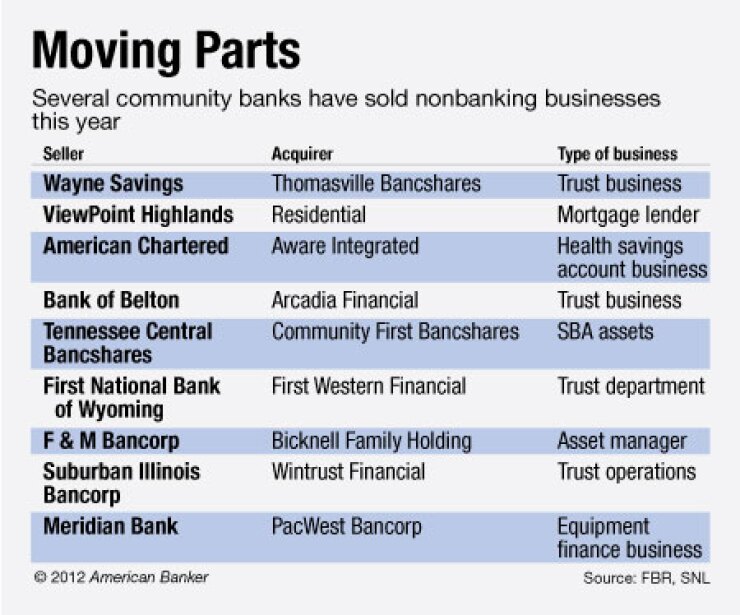-
Bank of Commerce Holdings in Redding, Calif., is selling its stake in its namesake mortgage company three years after becoming its co-owner.
August 31 -
A month after calling off a planned public offering, Customers Bancorp in Pennsylvania, led by former Sovereign CEO Jay Sidhu, will bring in $100 million in capital by acquiring Acacia Federal Savings.
June 22 -
The Columbia, S.C., company is used to gaining branches and other assets in past deals. Buying Savannah Bancorp adds an investment advisory firm and mortgage capabilities at a time when banks are looking everywhere for ways to boost fees.
August 9

Bank of Commerce Holdings in Redding, Calif., has cashed out of the mortgage business, even as other banks are betting heavy on such loans.
The $927 million-asset company recently
The move is surprising, some industry observers say. As banking companies search for fee income, mortgage banking has been able to boost earnings for a number of banks. Still, in the current regulatory environment, ownership stakes in side businesses are increasingly harder to justify.
"Across the financial services industry, as companies deal with the consequences of the Dodd-Frank Act, I think every organization is asking itself what sort of compliance burden can we handle," says Terry Keating, a managing partner at Amherst Partners in Chicago. "It is more complicated from a compliance standpoint to have partial ownerships."
Bank of Commerce Holdings (BOCH) bought the stake in 2009. It said the regulatory burden on the mortgage company was a big reason for selling its interests.
"These are booming economic times in terms of mortgage banking and the additional regulation that came with being partly owned by a bank was holding" the mortgage bank back, Patrick J. Moty, Bank of Commerce's president and chief executive, said in an interview Friday. "We had no specific time frame, but the timing appeared to be right. … That's the world we live in now."
Such deals are slowly becoming more common as bankers come to terms with the new regulatory environment. In June, Customers Bancorp in Wyomissing, Pa., said it would
In an interview, Scott Simonich and Mario P. De Tomasi, said the mortgage company has had a relationship with Bank of Commerce since roughly 2001. The ownership component was added as the mortgage bank was looking for ways to survive the downturn. However, the plan may have worked too well; the mortgage bank's size outgrew Bank of Commerce's capacity.
"A lot of our competitors failed, but we were able to stay in business and grow and as we grew we became more material to the bank," said Simonich, the mortgage company's chief executive. "That materiality meant more government oversight."
Split ownership may have been challenging for Bank of Commerce, but several deal advisors say they were surprised the bank didn't buy the unit outright. Keating says he often advises clients against partial ownerships unless it is part of a strategy to buy the whole company at some point. "Unless you're doing that to position yourself to own 100% eventually, why do it?" he says.
The mortgage bank funds more than $1 billion in first mortgages annually, according to regulatory filings. For the first half of 2012, Bank of Commerce reported $11.1 million of mortgage revenue, or 83% of the bank's noninterest income.
Given the difficulty finding new loan growth, more banks are turning to fee businesses to lift in revenue. A refinancing boom has made mortgage businesses attractive, but other companies have turned to businesses like trust and wealth management.
The sale might seem counter-intuitive, but it could also be an instance of Bank of Commerce staying ahead of the curve, says, Joe Garrett, a principal at the consulting firm Garrett, McAuley & Co. in San Francisco. "I think it is a smart move," he says. "People might look back and think [Bank of Commerce] sold at potentially the peak of the market."
Moty cited regulatory burdens for the sale, but Garrett says the bank may have also reduced exposure to the Consumer Financial Protection Bureau by winding its relationship down to one based on funding. "Warehouse lending, for instance, is very profitable with a heck of a lot less risk," he says.
Beyond regulatory burdens, Garrett warns that banks shouldn't get too reliant on mortgage revenue, adding that Bank of Commerce would be wise to invest time and resources toward growing the core business.
"It is real profitable and banks are making a killing right now, but they could give up huge amounts of gain when things do turn," Garrett says. "The mortgage industry unravels faster and further than anybody ever guesses."





